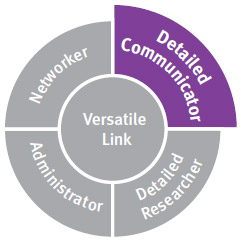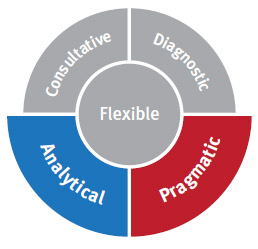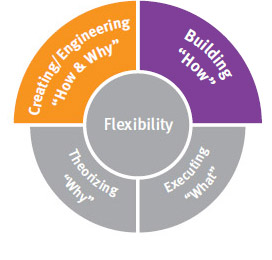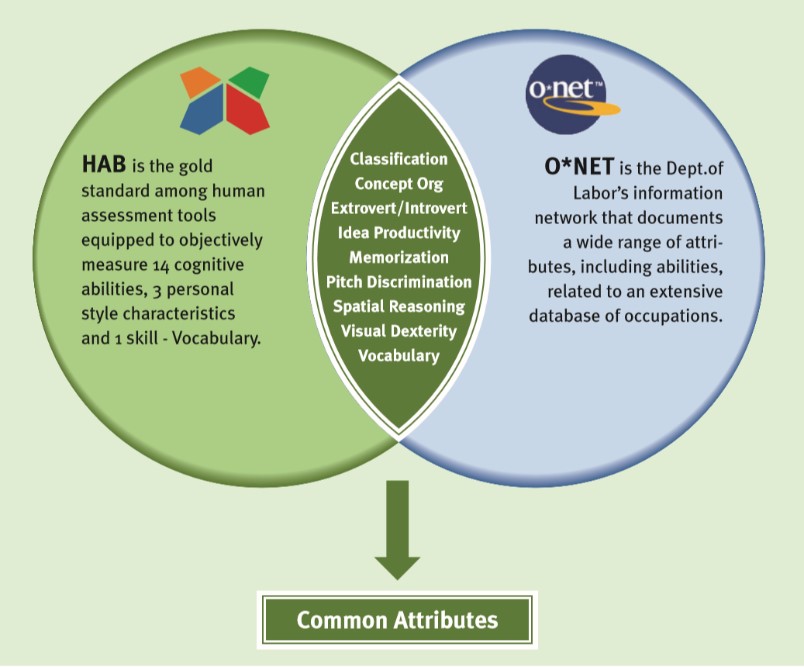

Congratulations! You’ve taken the Highlands Ability Battery (HAB), an important step in discovering your natural talents. Now you’re ready to make informed decisions as you begin to manage your own career.
Your Highlands Career Exploration Supplement (HCES) is a powerful tool that will take your career search to the next level. Turn what you know about your abilities into action and take charge of your career.
This report is your launch pad for career exploration, here is what you will find:
ONLINE EXPLORATION FOR MORE - access the Highlands Career Exploration report ONLINE for more in-depth descriptions of each ability and how they impact work roles. View an expanded list of ability patterns and careers to explore with hotlinks to the O*NET for information on careers.
Prepared for: Sample Report 1 Highlands Career Exploration SupplementYour HAB results were determined by using timed worksamples and are reported as percentile ranking scores. Worksamples are performance-based rather than self-report assessments. Percentile ranking scores are your score relative to tens of thousands of others in the Highlands database of test takers.
Your results from the HAB are displayed below [click here to access your full Student Report] //-->. When accessing this HCES online, you can click on any of the abilities below to find examples of how that ability can be used in a variety of work roles/career fields. Doing this can help you better understand an ability; it is not meant to suggest a specific job or occupation.
This report emphasizes how combinations of abilities work together. The combinations are unlimited. Once you learn the basic combinations or building blocks you can combine them yourself to create additional careers not mentioned in this report! You’ll be able to integrate these combinations with your interests, values, and goals any time you want to expand or redesign your career path.

As a Specialist with Extroversion, your personal style elements may feel slightly inconsistent or even incompatible. As a Specialist, you likely prefer to delve into areas that interest you on your own - you .nd that you may need or want to know a topic in more detail than others do. Your Extroversion pulls you toward sharing your special knowledge as soon as you have enough information to feel comfortable talking about it - you become energized by the process of sharing what you know with others. You prefer to be in the forefront in order to communicate and explain processes or policies to others.
You will likely find a good fit in tasks that showcase your individuality and specialized knowledge. Your unique perspective will help you succeed in positions where oral communication is necessary. You will be most satisfied with work in an area of extreme interest where you can interact with other specialists in your field or make presentations. Leadership in specialized organizations or projects that schedule group presentations will be appealing to you. You may enjoy teaching or training others in your area of specialization, making presentations to clients or colleagues, performing in musical or theatrical performances, or trial work in the field of law.

Intermediate: Combined with an intermediate completion date (1-5 years), work that requires relationship building or patience with a 1-5 year process before achieving an ultimate result may feel more motivating and meaningful.
You are drawn to activities that take time to achieve. You may feel that immediate, short-term tasks may hold little meaning to you unless you can see the connection to something you care about in the future. You are naturally able to hold 1-5 year goals in your mind, and you have the patience to work toward and see your activities as helping you achieve that goal. Examples are developing long term clients for a product (sales of large machinery or capital investments for the organization), working on a building project that may take several years to complete, researching and writing a book, working toward an advanced degree to forward your career. Work or educational responsibilities that require patience with a 1-5 year process or building more meaningful relationships will probably feel like a good fit.

Your low Classification and mid-range Concept Organization indicate you are able to understand and satisfy the need to impose logical steps in a process. Because you score in the mid-range of CO, you can systematically go from point A to point Z.
You will have the patience necessary to apply solutions to a problem in a methodical manner in order to come to a conclusion. Your logical problem solving skills will be useful in staying on course to complete a project especially if you have influence over the pace. The low score in Classification means that you will ultimately be able to find a logical solution for a problem. You may be a steadying influence on a team or in a project. You will not easily be diverted from completing the current project.
Your strong Idea Productivity, or divergent thinking, results in a continuous stream of sometimes related and frequently unrelated ideas. This type of thinking can contribute to both your ability to solve problems and to communicate. Your continuous, rapid flow of ideas can help you generate multiple ways to solve a particular problem. It can also help you adjust your communication so that if one explanation doesn’t work, you can quickly think of another way to explain.
This means you need a career that values generating ideas of your own, helping others to produce ideas, and facilitating discussion about the selection of creative and useful ideas. You may feel effective and satisfied in any field in which your role includes persuasion or influencing others.

Your mid-range SRT and strong SRV indicate you relate best to the physical or structural world and have a preference for concreteness in your work. You know how to make and build tangible projects and objects and you are also capable of understanding why things need to be designed or produced in a particular way. In simple terms, you understand naturally the “how” of things and you are able to implement the “why”. As a result, you are able to follow instructions and set to work because you understand the concepts or theories that resulted in the product they’re working on.
You will be drawn to work that allows you to physically handle materials. You may be interested in the reason behind the task, but completion of the project in the real world will be your goal. You may enjoy work roles in”hands on” fields such as construction, landscaping, farming, mechanical repair, surgery, dentistry, computer hardware development and construction, architecture, product development, and many others.
Moderate Visual Proficiency. Visual proficiency (or dexterity) includes both Visual Speed and Visual Accuracy. Your combination of scores indicates moderate visual ability related to paper work tasks. Your natural inclination is to emphasize accuracy over speed when proofing, working with numbers, coding, or tracking inventory.
Moderately Strong Creative Orientation. The HAB does not have a direct measure of creativity or artistic ability. The combination of Idea Productivity (thinking of many ways of doing something), Design Memory (remembering the overall pattern of something), and Pitch Discrimination (a sensitivity to small nuances of change and the effects of such a change) indicate a creative or artistic orientation. In addition to visual art, these abilities allow you to be creative with any kind of task you do. Your combination of scores indicates you have a moderately strong natural artistic/ creative orientation and you will want to choose work roles and other activities that allow you to express your creative side – especially your ideas.
Prepared for: Sample Report 1 Highlands Career Exploration SupplementYour general vocabulary provides you with the foundation for the breadth and depth with which you learn and communicate. Vocabulary is a personal tool developed by each individual over time, rather than a natural ability, but the range of your vocabulary will affect how effectively you can use some of your abilities. The Highlands Ability Battery tests vocabulary in isolation, which means there are no context clues in a paragraph to help you know what a word means, only a group of synonyms from which to choose. Many universities/colleges require an adequate general vocabulary for entry, and yours will be measured further by entrance exams and potentially later for entry to graduate school.
For adults, a strong general vocabulary can be a gateway to working with a wider variety of fields, working with more sophisticated clients or in professional fields that require the usage of a wider range of communication. A strong vocabulary can even influence gaining access to opportunities at higher levels of career development (management, supervision, teaching at graduate levels, law).
Regardless of your current vocabulary level, knowing how to develop your vocabulary can help you. Many careers require a specific or technical vocabulary, so discovering how you best learn new words and ideas will support you in any career you choose. Also, over time, focusing on the development of a specialized or technical vocabulary may divert developing and/or practicing your general vocabulary which may decline with disuse. If you ever decide to increase your vocabulary, use your most efficient learning channels (Design Memory, Verbal Memory, Tonal Memory, Rhythm Memory, and Number Memory) to assist you with building this skill.
Your score in General Vocabulary is in the low range. Increasing the number of words that you know, and especially improving the precision with which you know them, can help you build confidence in yourself and your abilities. When people improve their general vocabulary, they often find more opportunity to rise in organizations. You may have the most creative and innovative thoughts of anyone, but if you cannot communicate them effectively, they will not benefit you or anyone else. A precise vocabulary is the single greatest help in communicating your thoughts and ideas. You can build your vocabulary by reading widely and looking up less familiar words that you read or hear in conversation.
Prepared for: Sample Report 1 Highlands Career Exploration SupplementYou now have a wealth of customized information at your fingertips. Depending on your objectives, we offer three avenues to help you direct your efforts:
If you are exploring careers, either as a student for the first time or as an adult returning to work after a hiatus, our interactive HAB-O*NET Career Exploration Tool is a great next step. Highlands’ research-based career fit algorithms align your HAB-measured abilities with the Department of Labor’s extensive database of occupations to identify careers individualized to your unique profile of abilities. Smart Start
If you have years of employment experience and you are considering how to modify or enhance your current job or change roles within your career field, exploring our Ability Patterns will be an effective next step for you. Highlands’ career professionals with decades of experience in career development have identified patterns of abilities that reveal how you naturally approach your roles and responsibilities. Understanding your Ability Patterns can help you select aspects of your work to emphasize and de-emphasize as you grow in your career. Ready for Change
If you’re ready to take a deep dive into our Whole Person approach to career and life decision-making, consider working with one of our highly trained Highlands Certified Consultants to explore the other seven essential factors that make up the whole person. Factors such as skills, interests, personal style, family, values, goals and career development all contribute to making you the individual person you are today. Your Whole Self
The Highlands Company has partnered with a team of O*NET consultants from HumRRO, an independent, non-profit research and consulting firm with expertise in vocational assessment and career exploration, to develop the Highlands Ability Battery (HAB) Person-to-Occupation Fit matching tool.

The Ability Battery Person-to-Occupation Fit programming uses the set of Common Attributes to generate a list of 50 O*NET occupations that most closely align with your unique HAB profile.
The Interactive HAB –O*NET Career Exploration Tool will sort your list of 50 occupations by Job Family , Career Cluster , Interest and Rank Order to enhance your career exploration.